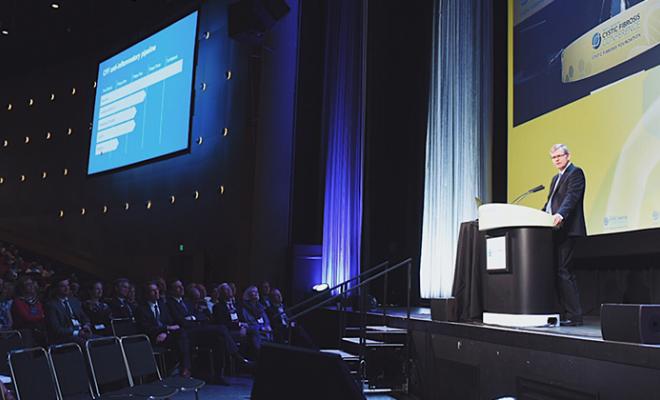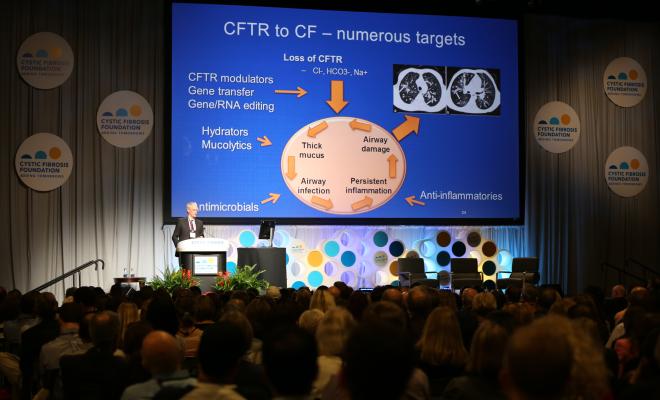A colleague once explained the complexity of inflammation by comparing it to a bowl of spaghetti. How do you find the one noodle (or pathway) that can reduce inflammation when there are so many?
The reality is, it's exceptionally difficult. Researchers have worked for years to find a drug that can dampen the exaggerated immune response in people with CF without affecting the body's natural defenses against infection or causing serious side effects. Inflammation may not get as much attention as other complications of cystic fibrosis, but it destroys lung tissue and can eventually lead to respiratory failure.
Significant progress has been made since 2015 when the Cystic Fibrosis Foundation convened a group of CF physicians and researchers to outline a path forward to tackle inflammation. This progress was the focus of today's Plenary 2, Anti-Inflammatories and Mucociliary Clearance Therapies in the Age of CFTR Modulators, at the 32nd annual North American Cystic Fibrosis Conference (NACFC) in Denver.
Improving treatments for complications of CF, like inflammation, was chosen as the theme for plenaries 1 and 2 because complications have a detrimental impact on the lives of people with CF. The Foundation expects that a large percentage of people with CF will still need these treatments in 20 years, despite the availability of highly effective cystic fibrosis transmembrane conductance regulator (CFTR) modulators. With this in mind, in 2017, the CF Foundation spent more money on research into CF complications than on any other area.
Janeil Whitworth, who has CF and takes a CFTR modulator, is battling chronic inflammation. In a video shown during the plenary, she talked about how happy she was to participate in one of the trials for a potential anti-inflammatory drug.
Janeil has been taking high doses of ibuprofen to reduce inflammation in her lungs, but she has to stop taking it when she goes on antibiotics for a pulmonary exacerbation. Life would be better, she said, if she could continue taking an anti-inflammatory while she received IV antibiotics.
What is exciting is that in the next few years, we are going to know whether Janeil's clinical trial, as well as the trials for three other potential anti-inflammatories are successful, said Felix Ratjen, M.D., Ph.D., who delivered the second plenary. Dr. Ratjen is an expert on inflammation and head of the division of respiratory medicine at The Hospital for Sick Children at the University of Toronto.
The results of these trials will hopefully lead to the approval of a novel therapy or inform a new way to address inflammation.
Dr. Ratjen said that inflammation is caused by dysfunctional CFTR protein, infections, and impaired mucus clearance in the lungs. He also explained how research has shown that neutrophils, a type of white blood cell, play a key role in CF lung inflammation.
In people with CF, neutrophils release massive quantities of enzymes that overwhelm signals to stop the immune system's attack on infection, leading to lung damage. Researchers have been looking into potential ways to inhibit these enzymes.
Dr. Ratjen talked about the positive Phase 2 trial results of acebilustat, a drug that would help resolve inflammation caused by neutrophils. He also discussed the Phase 2 trial results of lenabasum, which would increase the production of anti-inflammatory molecules while reducing the production of pro-inflammatory molecules. The results indicate that lenabasum can trigger the resolution of inflammation without suppressing the immune system.
Drugs in Development to Clear Mucus
In addition to funding anti-inflammatory research, the Foundation is supporting the development of therapies to aid in clearing the excessive mucus that builds up in the lungs of people with CF. This is an important area to address because the thick CF mucus in the lungs creates a fertile breeding ground for infections and makes it difficult to breathe. Although mucus clearance improves with the use of modulators, we need to make more progress in this area especially for those people who are not on modulators.
Currently, the Foundation is supporting multiple drug development programs focused on clearing mucus by improving airway hydration and thinning the CF mucus.
Although recent advances in CF care and drug development have led to significant improvements in the lives of people with CF, there is still a need for more effective mucus clearance therapies, anti-inflammatories, and anti-infectives.
People like Janeil need better drugs.
“When I think about the fact that my chronic inflammation can be controlled with a new treatment, I feel excited,” she said at the end of the plenary video. We see her walking hand-in-hand with her husband, Peter, and their 1-year-old son Fenn.
“It's really important that we continue to invest time and money in developing new anti-inflammatories so that we can have better quality of life and reach the milestones that we want to reach.”
Watch the full plenary below.
Join the conversation on Facebook.





